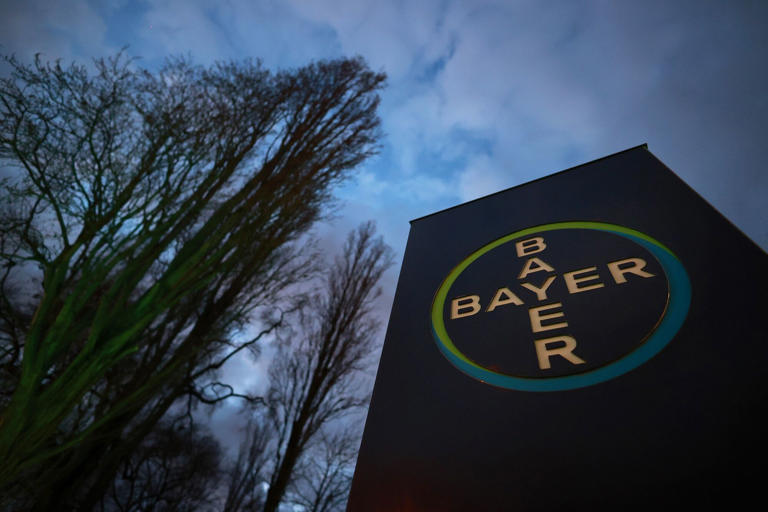Bayer AG is reportedly considering employing the Texas Two-Step bankruptcy maneuver to address the multitude of lawsuits in the United States alleging that its Roundup weedkiller causes cancer. This strategy involves seeking a bankruptcy judge’s intervention to halt further trials scheduled for this year, with the aim of reaching a settlement for over 50,000 cases. The Texas Two-Step bankruptcy method utilizes a Texas state law permitting companies to divide their assets and liabilities into separate entities, subsequently placing the unit burdened with liabilities into bankruptcy to facilitate a comprehensive settlement. However, courts have previously rejected similar tactics employed by other companies, such as 3M Co. and Johnson & Johnson, in separate litigations.
Bayer’s shares experienced minimal movement in trading on Thursday in Frankfurt, indicating investors’ cautious response to the news. Since Bayer’s acquisition of Monsanto in 2018, inheriting the Roundup brand for $63 billion, the company’s stock has depreciated by approximately 70%.
The decision to explore the Texas Two-Step bankruptcy maneuver comes amidst a series of costly jury verdicts against Bayer over Roundup. Despite some recent trial victories, including more wins than losses, the company faced significant setbacks, culminating in a substantial $2.25 billion verdict awarded by a Pennsylvania jury to a plaintiff attributing his cancer to prolonged Roundup exposure. Bayer maintains the safety of its product, but the mounting legal challenges have prompted the company to seek alternative avenues for resolution.
Legal experts, however, express skepticism about the viability of Bayer’s strategy, citing previous court rulings that have rejected similar approaches. Bruce Markell, a former federal bankruptcy judge now teaching law at Northwestern University, views Bayer’s move as a long shot for a settlement but suggests the company may feel compelled to pursue this route given the gravity of its legal predicament.
Stock Slide, Legal Overhang
Bayer has refrained from commenting on any specific plans regarding a bankruptcy filing related to the Roundup litigation, but CEO Bill Anderson has expressed a commitment to exploring all reasonable options to safeguard the company’s interests in the face of legal challenges.
The company stated that while it has encountered substantial jury verdicts concerning Roundup, it has successfully managed to significantly reduce many of these judgments by over 90% in post-trial proceedings. Bayer has also highlighted its favorable outcomes in recent cases, winning 13 out of the last 19 instances where judgments were entered.
Acknowledging the adverse impact of ongoing litigation on its profits, Bayer remains proactive in addressing the situation. Despite the slim likelihood of success with the Texas Two Step tactic, investor Markus Manns from Union Investment, a major Bayer shareholder, emphasizes the importance of exploring all available avenues to mitigate the influx of damage claims related to Roundup.
Bayer’s recent moves, such as nominating activist investor Jeff Ubben and former McKesson Corp. General Counsel Lori Schecter to its supervisory board, suggest potential preparations for a unit’s bankruptcy filing. Ubben, who has advocated for a Texas Two Step approach to address the Roundup litigation, and Schecter, with her background in handling complex litigation and corporate investigations, could provide valuable insights and expertise in navigating the legal challenges ahead.
Rejected Efforts
Bayer’s challenge lies in the multitude of lawsuits scattered across state courts nationwide, hindering its efforts to consolidate the Roundup litigation. Previous attempts to streamline the cases through a class settlement program were thwarted by a federal judge in 2021, prompting Bayer to adopt a strategy of settling cases selectively and going to trial when necessary.
While initially successful, with Bayer winning nine consecutive cases, the tide turned in the fall with several high-profile losses, eroding its bargaining power and prompting an influx of new claims. With approximately $10 billion already spent from a $16 billion reserve set aside for resolving over 110,000 Roundup cases, the company aims to gather the scattered lawsuits under a bankruptcy judge to negotiate a comprehensive settlement.
However, the Texas Two-Step tactic, aimed at leveraging bankruptcy court for settlements, has faced criticism from legal experts for enabling solvent companies to exploit the bankruptcy process. Recent rulings in cases involving Johnson & Johnson’s baby powder litigation have rejected similar attempts, deeming the company financially stable enough to bypass bankruptcy protection.
Despite these setbacks, J&J remains committed to exploring bankruptcy as a means to resolve the prolonged legal battle over its baby powder products.
The Two-Step
Moving a unit to Texas to take advantage of the state’s laws could be a potential strategy for Bayer to facilitate a settlement in the Roundup litigation. While Bayer is a foreign company, Monsanto, the original producer of Roundup, was headquartered in Missouri, and Bayer retains significant operations there. It remains uncertain whether Bayer would utilize the Monsanto name or another entity for any Texas Two-Step maneuver, according to sources familiar with the discussions.
If Bayer were to pursue this strategy, a bankruptcy judge would likely pause all litigation against the company, providing a temporary reprieve. However, the legitimacy and ethical implications of employing such tactics have been subjects of debate. Melissa Jacoby, a bankruptcy expert at the University of North Carolina, criticized the move, suggesting it prioritizes delay over addressing the legal rights of cancer patients or reaching a fair settlement.
Ralph Brubaker, a bankruptcy law professor at the University of Illinois, acknowledged that while Texas Two-Step bankruptcies may face scrutiny from the courts, they effectively enable defendants to indefinitely suspend tort litigation. This approach could afford Bayer the time needed to develop a settlement proposal.
